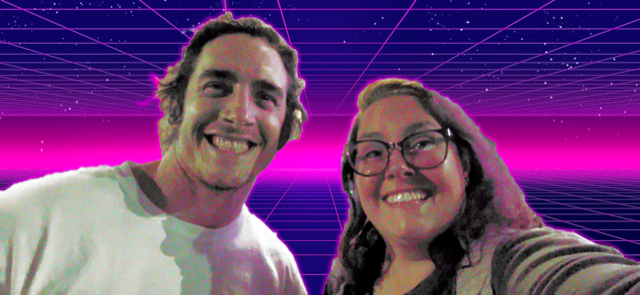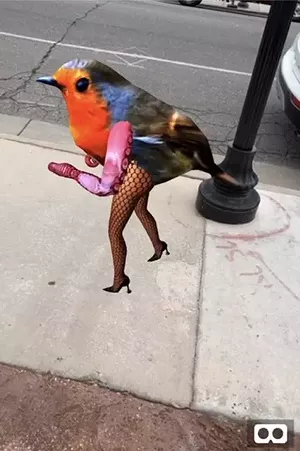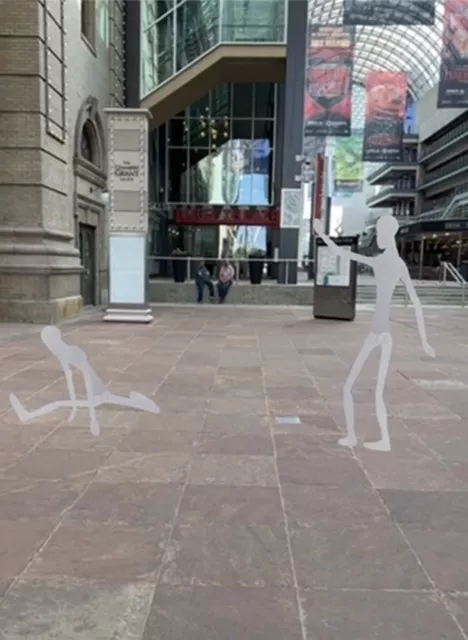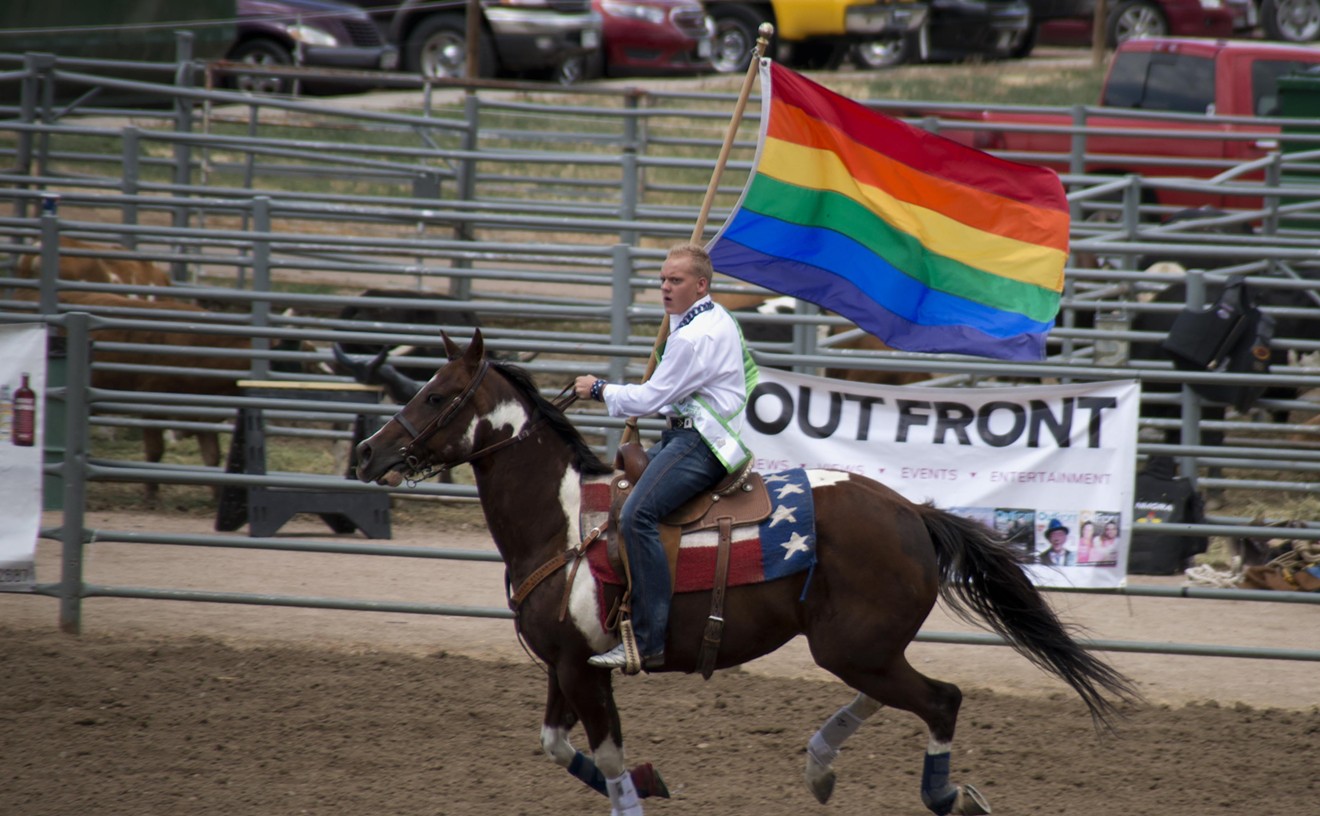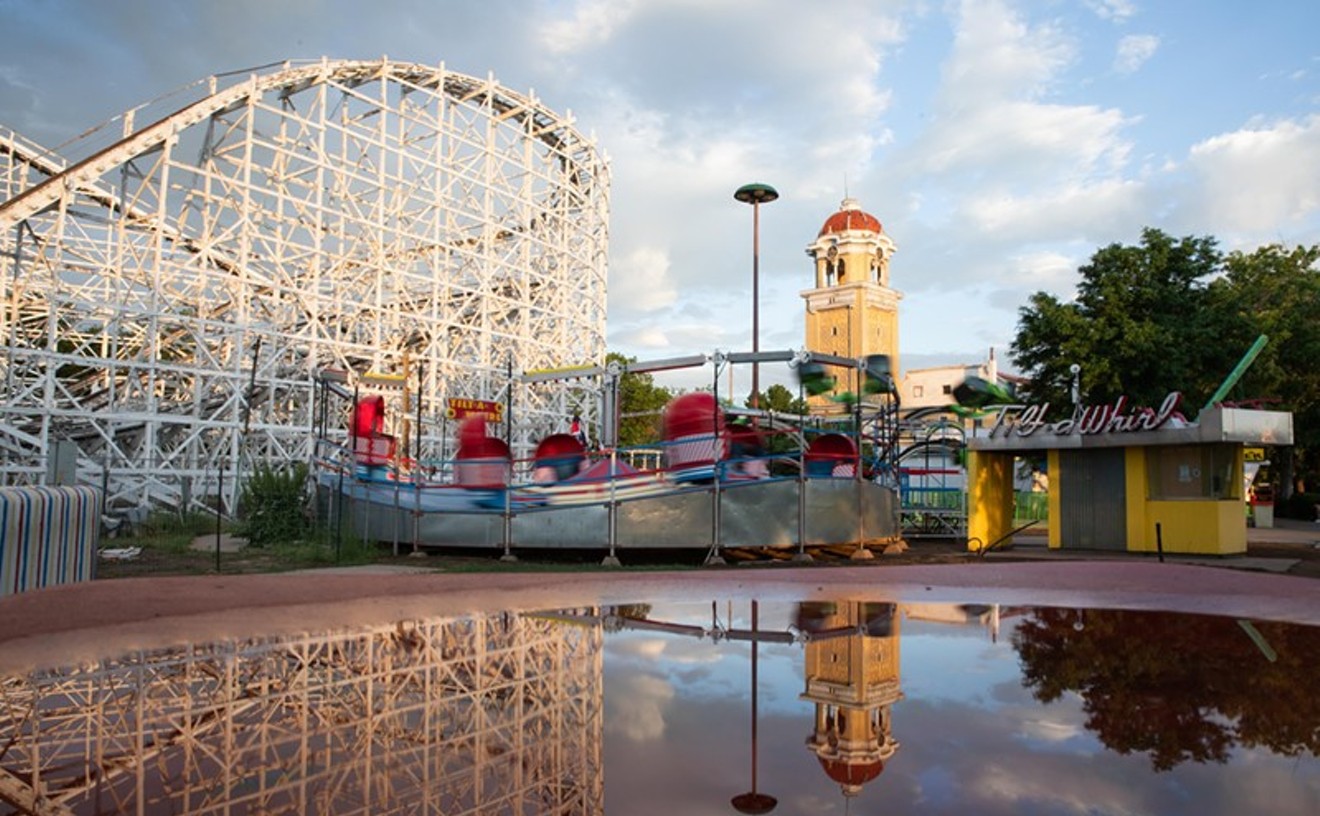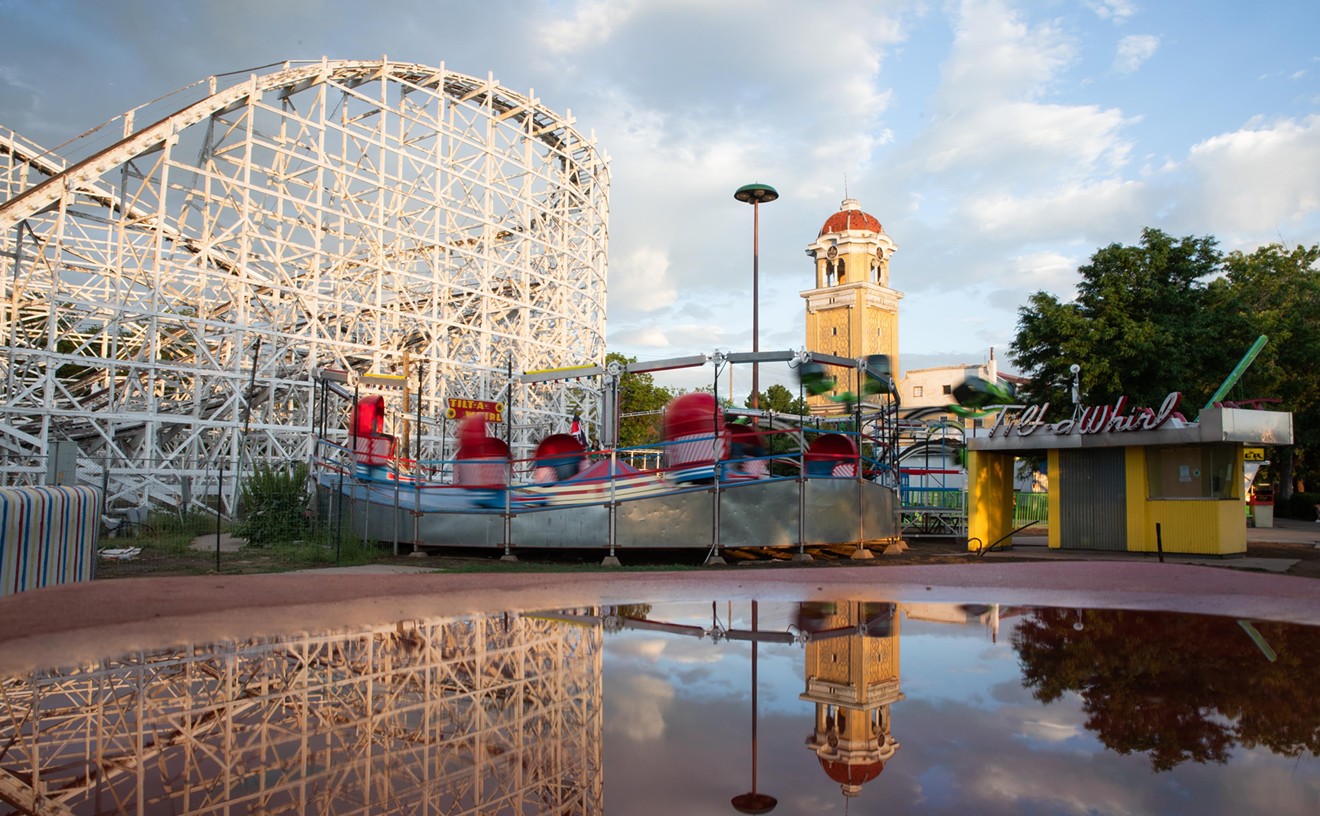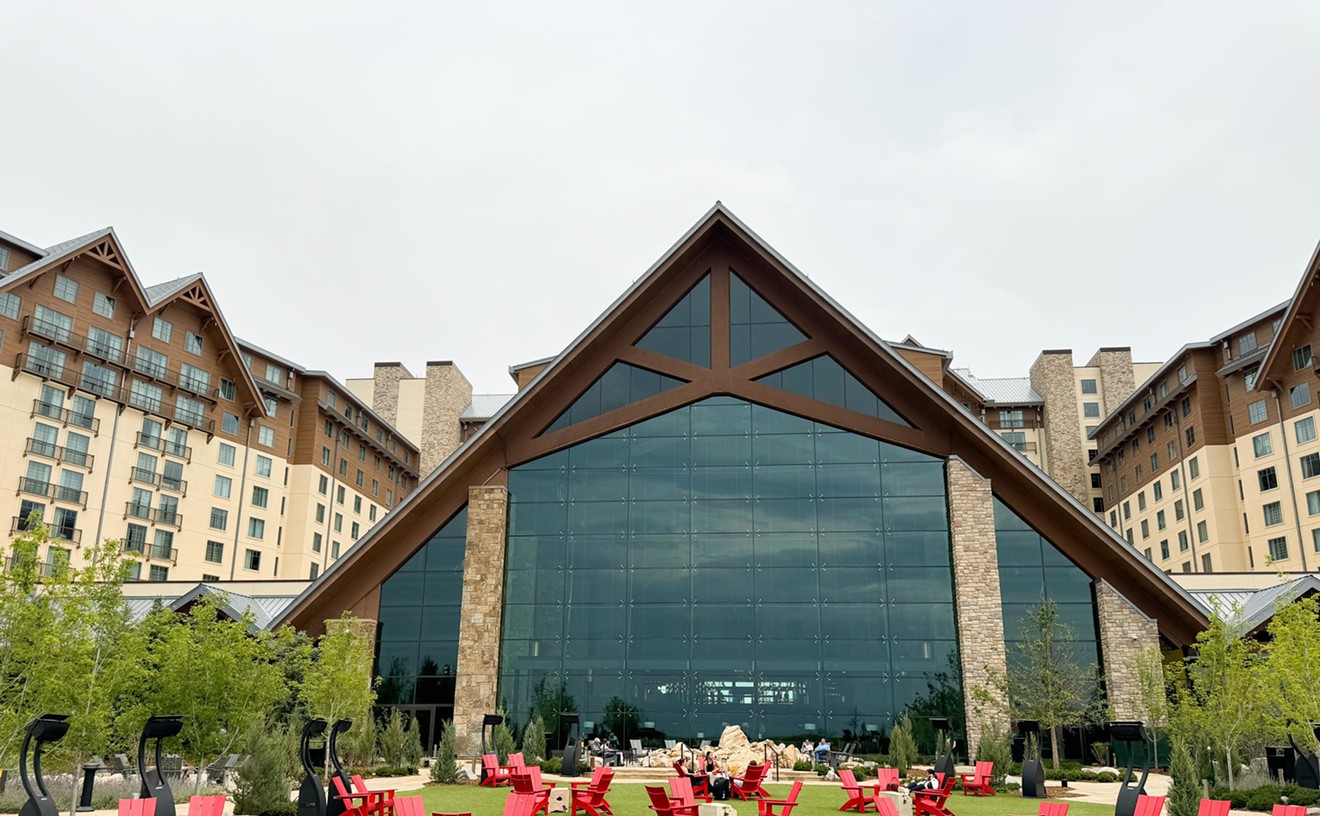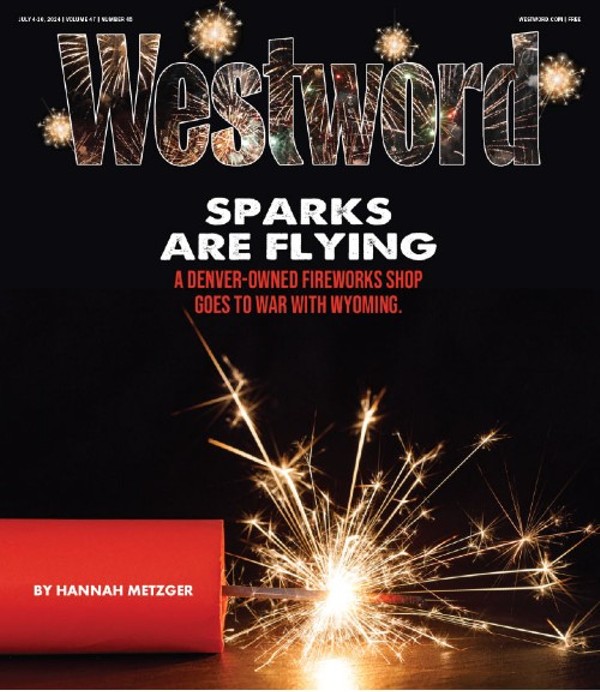From performance to paintings to poetry, activist art takes many forms. In 1916, Dadaists Hugo Ball and Emmy Hennings mounted the Cabaret Voltaire at a cafe in Zurich, where they invited creatives such as Wassily Kandinsky, Paul Klee and Sophie Täuber-Arp to join in anarchic performance art that made a statement against the First World War. In 1937, Pablo Picasso painted "Guernica," a legendary piece of anti-war protest art. On October 7, 1955, Allen Ginsberg read his visionary poem "Howl" for the first time at San Francisco's Six Gallery, upbraiding American consumerism and extolling sexual liberation.
And on October 15, 2022, the new artist collective Denver Digital Land Grab will flood the city with purposeful art through augmented reality to illustrate numerous social and political issues plaguing creatives. Their motto? "We are taking space. We are not asking for permission."
Founders Corrina Espinosa and David Hanan have been anticipating the collective's first exhibit, Manifest Dystopia, since December. The road out of the pandemic has been filled with potholes — from the economy to housing, civil rights movements to Roe v. Wade, the toxicity of social media to rising mental health crises — and Espinosa and Hanan recognized that neither the government nor benevolent billionaires were stepping up to fix any of them. So they decided to speak up and push back, and what better way to do that than through a renegade art collective?
"We were watching artists be pushed out of their studios and their places of residence in the RiNo area at the same time entities like Meow Wolf are starting to breathe life into the art community. It seemed like such a juxtaposition," says Hanan. "All of these issues with rental spaces in Denver and tech companies exploiting us. [Manifest Dystopia] feels like just a natural response to it. A feeling that we actually might be able to do something about it — we might be able to leverage augmented-reality technologies to allow artists to spread their work across the city of Denver."
"We want to have a visual conversation about the social problems and all the social anxiety that's been affecting [artists] specifically in the last three, three or so years. And so that's what this art is," explains Espinosa, a Denver native who says she's personally incensed by "the real estate market right now. It literally has a death grip on not just the artists of Denver, but everybody. And so I think that the companies that are snatching up residential areas had better be careful, because we're coming for them."
Rather than "coming for them" armed with paintbrushes and palette knives, the collective is using augmented reality. "The best part about AR is that there's all this free digital space and there are no laws, there are no rules. There are no regulations at this point," Espinosa says. "When space is such a commodity for artists, [and there's] all this free space, and you can do anything you want with it — that’s what I think is one of the most exciting things about the project."
A full-time artist and digital arts teacher at the University of Colorado Boulder, Espinosa says the idea to create an augmented-reality arts collective hit her like a "lightning bolt” last winter. She's witnessed social and economic shifts in the city her whole life, but seeing artist friends unable to afford studio space in an increasingly expensive city lit a fire in her.
"I even got kind of sick to my stomach, and I was shaking," she recalls. "I have this idea I really want to do, and David and I had just met right around that time. ... Both of us are pissed off about all the changes that have been happening and seeing the cracks in the system over the last three years."
She and Hanan became "instant best friends" while working on an immersive show at Spectra Art Space last year. Although she is proficient in AR, Espinosa knew that Hanan, who has worked in virtual and augmented reality for six years, would be indispensable. "It was like serendipity," she says. "I had this great idea, but honestly, I couldn't do it without David, because he's the master at the tech end of it. We really complement each other."
Hanan, who moved to Denver fourteen years ago and is the creative director for Squirrel Creek Lodge, recalls that at the time they were brainstorming the AR collective, the European Union was raking Facebook and Google over the coals for misusing data. He remembers thinking: "There's got to be a way to flex this technological muscle without devoting ourselves to these mega-conglomerates who are clearly doing shady things with private data and who would clearly try to subvert us if we were to use their platforms as a medium for protest or political expression.”
While Manifest Dystopia will exist online, the Digital Land Grab founders are adamant that viewers won't be giving up any personal data. "We're very, very proud and almost militant about it that we want to offer this in a platform that is agnostic — device agnostic, user agnostic. ... Any phone that can access the Internet can open a browser and begin interacting with the exhibit," Hanan says. "It does not require you to submit any information except for your location. But we don't save data, and we're not interested in mining or soliciting people for their private information, and that's something we're very proud of."
"There are two ways to access [the exhibit]. We'll have QR codes to scan, and the other thing you can do is just get onto our website, and we'll have maps and lists, and you just click on links depending on your location," Espinosa adds. "We're going to have art clusters in neighborhoods all over the city. So you go to a certain cluster, and then you go to that section of the page, and you click on the link or links, and then you'll be able to access the art in that area. It's all completely online, no app."
To embrace augmented reality is to embrace the future, Hanan says, and it's not as foreign a concept as many believe: From Google Maps to Snapchat and Instagram filters, most people engage in AR on a daily basis. "What's next is that same kind of interaction with the spaces around us, not just our faces," he says.
The exhibition’s name is meant to "address our dark history" by combining Manifest Destiny and dystopia. "It's really easy to see all the characteristics of dystopia that we're living in right now, and so that's what we want to address," Espinosa explains. "We only want local artists for this particular exhibition, because we're trying to elevate local artists [and] kind of Robin Hood the city. We want to take all this space, and we want to give it to the local artists, especially those who don't have a space to show their work. We're kind of like champions of the underdogs, for sure."
Digital Land Grab has been accepting art in all mediums for Manifest Dystopia, with the prompt asking artists to submit work that not only shines light on a problem at a specific location, but also offers a solution for improvement. And artists who submit don't have to know anything about AR; their work will be rendered by the collective’s coders, who will place them in their intended spaces. "That's one thing that confuses artists: A lot of them think they have to be a digital artist to participate in AR, and that's simply not the case," Espinosa notes.
"If someone has a statement to make about Union Station, we can position that art right next to Union Station and allow the viewers to be fully immersed in the mindset of the artist," Hanan notes. "If they have a comment to make about rivers and mountains, they can put that art with the backdrop of those same rivers and mountains, or they can augment those rivers and mountains and allow a user to fully interact with the idea of, ‘What does this look like through the eye of the artist?’"
Digital Land Grab already has art up in the city and other spots around the state, which you can find in its online gallery. "Corrina took the very classic and instantly recognizable Welcome to Colorful Colorado signs and animated them," Hanan says. "So within the Digital Land Grab infrastructure, once you're at the site, you can activate the experience and then just point your phone at the Welcome to Colorado sign and it triggers one of the animations, and that's effective on all of the signs."
The artists have also been leaning into their Robin Hood nature with roguish pranks. On April Fools' Day, they mounted an "NFT Garage Sale” in RiNo, where they sold NFTs for cash in the form of "fungible wooden tokens," which were imprinted with URLs on one side that would activate augmented-reality art on the other.
"We were making fun of NFTs,” Espinosa says. “It was satirical, but it also had a good purpose behind it: We were also teaching the community, especially the fine arts community and people who felt like outsiders in the NFT room. We were teaching them how to mint NFTs, and that they could participate."
They held another pop-up at the Denver Center for the Performing Arts' Quixote Nuevo fiesta in May, where they started handing out printed URLs to patrons; scanned, they showed 3-D models of the famous Jonathan Borofsky “Dancers" doing the samba. Security came and told them that they couldn't hand out materials at the event, but the artists still lingered.
"We see a scuffle," Espinosa recalls. "There are people on radios, and I'm like, 'Well, either something really bad or something really good is about to happen.' So this lady approaches us, and she's like, 'Okay, what exactly are you guys doing?' So I hand her the card and I'm like, 'We're Denver Digital Land Grab, we're taking space, we're not asking permission, and we have a gift for you and the people of Denver.' And then she sees the dancers through her phone and her whole tone just turned. She said, 'We would love to accept your gift. This is so great. In fact, I'll help you pass out the cards.' ... We got such a good response; everybody loved it."
The woman was none other than DCPA COO Gretchen Hollrah. "It ended up being a really positive experience," Espinosa reflects.
Digital Land Grab has big plans. The exhibitions will extend beyond Colorado at some point; Espinosa and Hanan hope to mount a project in Venice Beach this winter with the help of friends Scott Bailey and Myah London Harwell, the owners of Sally Centigrade, a gallery that moved from Lakewood to Venice Beach in February.
But for now, the collective is focused on launching Manifest Dystopia. The virtual Cabaret Voltaire of Denver will certainly have a longer life than the Dadaists achieved: The art will be there to stay and make its statements for all to see (in the metaverse, at least).
"We believe that this exhibition, and the exhibitions that we have yet to curate, can really bring about actual social change through visual conversations," Espinosa concludes. "That's what the ultimate goal is: We want to make real life change."
For more information, visit DigiLandGrab.com.
[
{
"name": "Air - MediumRectangle - Inline Content - Mobile Display Size",
"component": "12017618",
"insertPoint": "2",
"requiredCountToDisplay": "2"
},{
"name": "Editor Picks",
"component": "17242653",
"insertPoint": "4",
"requiredCountToDisplay": "1"
},{
"name": "Inline Links",
"component": "18838239",
"insertPoint": "8th",
"startingPoint": 8,
"requiredCountToDisplay": "7",
"maxInsertions": 25
},{
"name": "Air - MediumRectangle - Combo - Inline Content",
"component": "17261320",
"insertPoint": "8th",
"startingPoint": 8,
"requiredCountToDisplay": "7",
"maxInsertions": 25
},{
"name": "Inline Links",
"component": "18838239",
"insertPoint": "8th",
"startingPoint": 12,
"requiredCountToDisplay": "11",
"maxInsertions": 25
},{
"name": "Air - Leaderboard Tower - Combo - Inline Content",
"component": "17261321",
"insertPoint": "8th",
"startingPoint": 12,
"requiredCountToDisplay": "11",
"maxInsertions": 25
}
]


